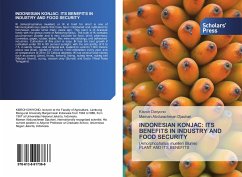IK (Amorphophallus muelleri) or IK in brief for short is one of Monocotyledonous plants that have been introduced and cultivated by Indonesian people since many years ago. This plant is of Araceae family with the genus name of Amorphophallus. The bulb of IK contains glucomannan powder and is very valuable for food, drink, pharmacy, cosmetics, paper, rubber, textile, film, mine microbiology, and adhesives industries. Cultivation of this plant is easy. IK has the best growth if cultivated under 50 to 60 percent sunlight, with the soil acidity of 6 to 7.5, in sandy, loose, and compost soil, lowland to upland (1,000 meters above sea level), rainfall of 1,000 to 1,500 millimeters every year, and air temperature of 26 to 30 Celcius degrees. IK has several local names such as porang (Java), kruwu, lorkong, labing, subeg leres, subeg bali (Madura Island), acung, cocoan oray (Sunda) and badur (West Nusa Tenggara).








